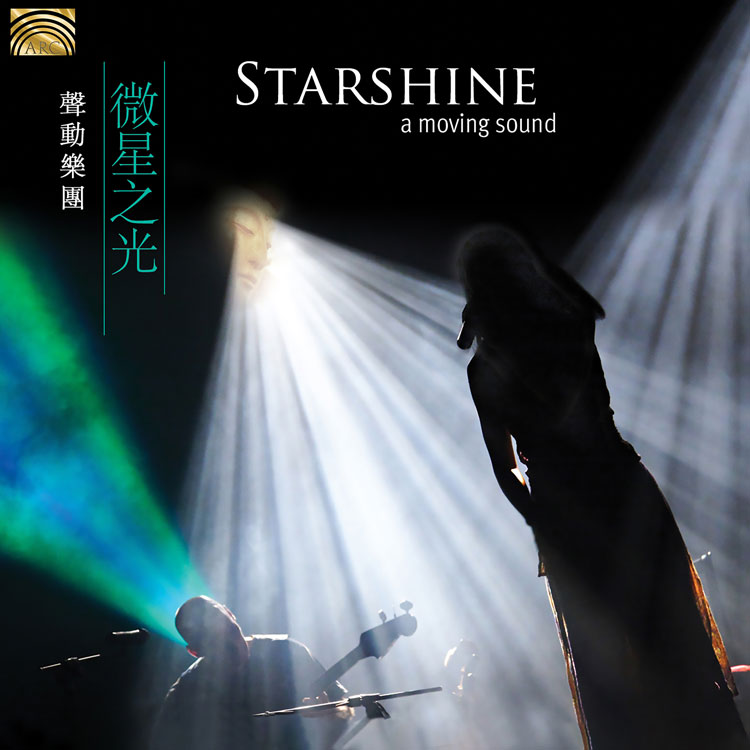A Moving Sound – Starshine (ARC Music Productions, 2022)
Groundbreaking Taiwanese band A Moving Sound is back with yet another engaging, finely crafted and accessible set of recreated folk songs and modern compositions grounded in aboriginal Taiwanese, Chinese and other musical traditions.
“In this album we have our version of a Taiwanese folk song, an Ode to the Earth God Toh De Gong
with lots of laughing. There is an ominous approaching storm in Howling Wind, the rise and fall of a Dynasty and the pure joy of a childhood fantasy in Jump.”
The band describes the songs on Starshine: “Harvest is a celebration of seeds planted which have come to bear fruit. A new life comes into the world with nothing but absolute trust and pure joy. This unlimited abundance of life energy is always ready to resonate with the world’s wonderful vibration! Cheer and celebrate this moment, it’s a harvest of the soul! The six-beat rhythm played on the drum comes from a traditional Xinjiang (western China) rhythm called Tez.”
Meanwhile, “Starshin is inspired by the Eastern spiritual concept of reincarnation, the soul’s journey through life after life, ever evolving and learning. The Buddhist chant “Pure-Land Rebirth Dharani” heard during the end of the song is used to guide the soul from one life to the next at the time of death. The ultimate goal is to transcend the cycle of birth and death and obtain the release from the root of karma. Early in the song, a woman expresses, in her Taiwanese aboriginal TAU dialect, how the stars are watching down on us with compassion. In this language, the word “star” is created from the image of “eyes in the sky”.
On the other hand, Howling Wind reflects the “tension and a mysterious sense of foreboding fill the close air as a typhoon approaches. The rising winds stir fear in the heart alongside a dark concern for our mortality. We seek mercy, we pray for a safe passage.”
Regarding the Dance of the Eagle, A Moving Sound explain: “The eagle is in love with the sky, and the sky is in love with the eagle. The intertwined sounds of the satar [a 13-stringed bowed lute from Xinjiang, western China] and the voice depict a vivid rhythmic interplay of wind and winged. The eagle sometimes hovers, sometimes spreads its wings and soars, always confessing its feelings to the sky. Mia’s voice flows and changes timbre in the style of resonant highland singing. Her magical voice, accompanied by the harmonic meditative ambience of satar, transports us on a journey along the expansive stretches of the Silk Road.”
With respect to ‘Meeting in Emptiness,” the story is: “The clouds move, but the sky always remains the same, the boat departs, but the river bank stays fixed, a person may fade away, but the heart will not leave, the loving connection is never broken. The opening lyrics come from a traditional folk song of the Guangxi province of China, and hold a deep Zen quality. The words convey an understanding that the loving connection between people mirrors the interconnectedness of all things in the vast Universe. True love can transcend space and time and meet in eternity.”
The song ‘Dynasty’ “expresses the turmoil that accompanies the rise and fall of all man-made power structures. If you listen carefully, you will hear a five-beat rhythm motif used in the song. The number five is a symbol of conflict arising from the solid and stable foundation of four.”
‘An Appearance’ celebrates nature: “The birds are chirping, the sun is filtering through the leaves of the trees. The magic of this beautiful day fills you as you walk through the forest, vibrating with the power of nature. A moment comes… you sense the presence of something supernatural; a spiritual being has graced you and then fades away. You continue walking and sensing, all the more enraptured by the infinite possibilities of being. You proceed down along the path until you come to a clearing, a lush and grassy meadow… you could almost swear the spirits are dancing all around you… and then… they are THERE!“
Next, with Toh De Gong (the Earth God), the band takes us to the spiritual side of Taiwan: “Toh De Gong is the most popular god in Taiwanese traditions. Mia wrote the lyrics based on the traditional worship and ceremony, and created the humorous personality of the Earth God. This song is sung in Taiwanese dialect.”
As to ‘Jump,’ this piece is described as A Moving Sound’s “Ode to Joy”. “Our only wish for this song is to lift you up! We all must stay connected to our innocent and romantic spirit. Although the future is full of challenge and unknowns, we are ready to open our arms, step bravely, and jump for our dreams!”
Lastly, ‘The Master Sighs” closed the album. “The master guides his students through the secrets of life. Answers come as they will and cannot be forced. Commitment is necessary, but perhaps equally important is knowing when to take a break from the effort… and have a party!”
Performed by: Mia Hsieh on vocals; composer Scott Prairie on zhong ruan, bass guitar, gong, vocals; Cheng-Chun Wu on percussion, saxophone synthesizer; Chang-Chin Lo on erhu; Hua-Jou Hsieh on guitar, octave 12-string guitar, zhong ruan, vocals, bass (track 10).
Guests: Yi-Chen Chang on satar, violin, vocals (track 1). Guest singers and narrator: Yulin Deng: track 8; Si Lele: track 2′ Pei-Chun Wang, Yen-Hua Lee, Shio-Mei: tracks 1 and 8.
Buy Starshine


